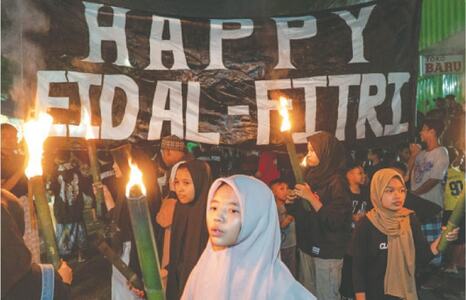
WASHINGTON: As the sun gently dips below the horizon, marking the end of another day of fasting, I find myself among fellow Muslims gathering for iftar.
The air is tinged with anticipation, my eyes automatically searching for the comforting sight of pakoras, samosas, and Rooh Afza. However, my heart sinks a little; they are nowhere to be found. Resigned, I reach for a simple glass of water.
“Sometimes, it feels fitting to break our fast with something as elemental as water,” muses Shah Jee, a Pakistani-American hailing from Lahore.
Even at a recent iftar at the offices of The Washington Times newspaper, where I had expected a lavish spread, the absence of those cherished delights was palpable. Just as I resigned myself to breaking my fast with water, a stranger, later introduced as Dave, a Jewish man, kindly offered me dates.
Muslims in United States experience Ramazan in a multitude of settings
This iftar at the paper’s offices was hosted by a group of Muslims who recently visited Israel. Though the discourse navigated themes of harmony and shared values among Judaism, Christianity and Islam, the focus was not on the pressing need for peace in Gaza.
Culturally enriching
This Ramazan, the Muslim community has had the privilege of experiencing several other iftars in a multitude of settings.
The most culturally enriching was the iftar in Springfield, Virginia, arranged by a group called Make Space on the evening of Jummatul Wida (the last Friday of Ramazan). It proved to be not only a memorable spiritual occasion but also a distinctive culinary delight for food enthusiasts.
Around 400 participants contributed homemade dishes, fostering a sharing of culinary delights from diverse regions. Amid the feasting, prayers were offered for peace in Gaza and for an immediate ceasefire.
The event was a diverse gathering, with an equal representation of women and men, and it transcended sectarian divides as well, as Make Space discourages such divisions.
‘Protest iftars’
In Washington, one of the major iftars was hosted at the Pakistan Embassy, where a significant number of guests were US officials and diplomats from various nations. The embassy also invited representatives of other religions — Christians, Jews, Hindus, Buddhists, and Sikhs — to its iftars and encourages them to address the gatherings.
And a Shia Islamic Centre, Shah-i-Najaf, invited their Sunni friends every weekend during this Ramazan. At this, and the Turkish mosque in Lanham, guests witnessed firsthand the spirit of hospitality and generosity that defines Ramazan. Despite theological differences, they came together as one community.
Two ‘protest iftars’ also took place. The first occurred outside the IMF headquarters during a protest organised by PTI USA, leading to the IMF allowing participants to observe iftar and perform Maghrib prayers under their roof.
Subsequently, a coalition of Muslim organisations arranged a protest iftar outside the White House, while President Joe Biden hosted some Muslim leaders at his official residence.
Mosques in New York, however, also served another purpose this Ramazan — sheltering refugees from African countries.
Many mosques opened their doors to these migrants during the daylight hours to rest and recover, oftentimes following restless nights sleeping on the streets or in the subway. During the last 10 days, many spent their nights as well.
Zahid Hussain Bukhari, executive director of the Council for Social Justice in Washington, says there are almost 3,500 mosques in the United States.
“Mosques are increasingly becoming community hubs where Muslims extend invitations to people of other faiths for events like iftar, particularly significant during the last 10 days of Ramazan,” he said.
Published in Dawn, April 10th, 2024












































Dear visitor, the comments section is undergoing an overhaul and will return soon.